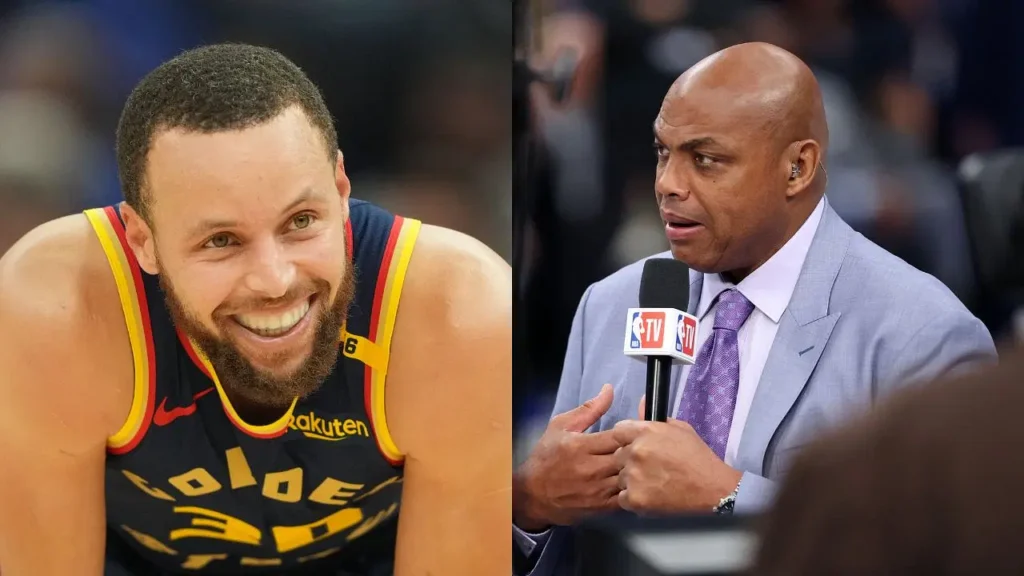
Charles Barkley Raises a Serious Concern Regarding Stephen Curry
In the world of basketball, Charles Barkley and Stephen Curry are two figures who have garnered significant attention. Barkley, a Hall of Famer and an outspoken basketball analyst, is known for his candid opinions on various players, teams, and issues within the NBA. Stephen Curry, on the other hand, is widely regarded as one of the most influential and transformative players in the history of basketball. Curry’s shooting prowess, leadership, and ability to change the game have elevated him to iconic status.
However, despite their contrasting personalities and roles within the NBA ecosystem, Barkley recently raised a serious concern about Curry’s career. This issue goes beyond Curry’s on-court ability and focuses more on the broader implications of his influence on the game and its future. In this article, we’ll explore Barkley’s concerns, dissect their validity, and analyze how this issue could affect not just Curry, but the future of the NBA itself.
Charles Barkley: A Brief Overview
Before delving into the specifics of Barkley’s concern, it’s important to understand who Charles Barkley is. Barkley was a dominant force on the basketball court, playing for the Philadelphia 76ers, Phoenix Suns, and Houston Rockets over his career. Known for his powerful style of play despite being undersized for a power forward, Barkley made a lasting impact on the game. He was an 11-time NBA All-Star and won the NBA MVP in 1993 while playing for the Suns.
Since retiring from playing, Barkley has transitioned into a successful career as an analyst on the popular show Inside the NBA. His candid, sometimes controversial opinions have made him a beloved and polarizing figure in the basketball community. Barkley is often quick to share his thoughts on the state of the league, the performance of players, and broader issues facing the game.
Stephen Curry: A Basketball Revolution
Stephen Curry, drafted by the Golden State Warriors in 2009, is perhaps the most revolutionary player in modern basketball. His journey to stardom wasn’t typical. Curry was initially seen as too small, too slender, and too unconventional to be an elite NBA player. However, his transformation into the greatest shooter in NBA history shattered conventional wisdom about what it takes to succeed at the highest level.
Curry’s influence on the game has been profound. His ability to hit three-pointers from virtually anywhere on the court has forced teams to rethink their offensive strategies. His remarkable shooting range has transformed the way basketball is played, with more teams emphasizing the three-point shot than ever before. Curry’s skill set has been so influential that he is often credited with helping usher in the era of small ball and perimeter-centric play.
Beyond his shooting, Curry is also known for his leadership and character. His calm demeanor, unselfishness, and ability to perform in high-pressure situations have made him a beloved figure in the NBA. Curry’s accolades speak for themselves: multiple MVP awards, multiple NBA championships, and a legacy that will forever be associated with the Golden State Warriors’ dynasty of the 2010s.
The Serious Concern: Barkley’s Critique
Charles Barkley’s criticism of Stephen Curry has caught the attention of both basketball fans and analysts alike. While Barkley is no stranger to speaking his mind, this particular concern he raised regarding Curry has sparked a lot of debate. Barkley’s issue isn’t about Curry’s basketball skills, which he acknowledges are extraordinary. Instead, Barkley’s concern revolves around Curry’s impact on the future of the game, particularly how the emphasis on the three-point shot is altering the fabric of basketball.
Barkley, as someone who played in a different era, has a more traditional view of basketball. He played in an NBA that was built on physicality, post play, and dominance in the paint. For him, the game was about balance, versatility, and the importance of inside-out play. With the rise of the three-point revolution, Barkley believes that basketball is losing some of its fundamental aspects, such as low-post play and mid-range shooting.
One of Barkley’s key concerns is that the game has become too reliant on three-point shooting, with teams often neglecting other aspects of the game. He argues that Curry’s style of play, while impressive, has led to an overemphasis on long-range shooting. This, in turn, has made teams less focused on the fundamentals of basketball, such as passing, ball movement, and establishing a strong presence in the paint.
Barkley has also pointed out that the current trend towards three-point shooting has made the game less physical. In his view, the NBA is moving towards a less balanced, less entertaining style of play. His critique is not necessarily an attack on Curry himself but rather on the broader impact of the “Curry effect” on the evolution of the game.
Is Barkley’s Concern Valid?
To assess whether Barkley’s concerns are valid, it’s essential to understand the evolution of basketball and the role that the three-point shot plays in the modern NBA.
The Evolution of the Three-Point Shot
The three-point shot has been a part of the NBA since 1979, but it wasn’t until the last decade that its impact became truly transformative. Teams like the Golden State Warriors, led by Curry, have made the three-pointer central to their offensive identity. The emphasis on spacing the floor, shooting from deep, and using the three-pointer as a weapon has fundamentally altered the way basketball is played.
In many ways, the rise of the three-point shot has made the game more exciting and unpredictable. Teams can score quickly, and the game has become faster-paced, with more emphasis on transition play and perimeter shooting. The ability to stretch defenses with shooters like Curry has created more open lanes to the basket, leading to easier scoring opportunities and higher-scoring games overall.
However, there are drawbacks to this transformation. As Barkley points out, the increased reliance on three-point shooting has led to a reduction in other aspects of the game. Post play, for instance, has become less relevant, and the traditional center’s role has diminished. Big men who were once dominant in the paint now have to adapt to the new style of play, often learning to shoot from the outside or defend on the perimeter.
Additionally, the lack of physicality in the modern game is noticeable. The NBA’s rule changes have made it more difficult for defenders to be as aggressive, leading to less physicality in the paint. While this has made the game more accessible to smaller, more skilled players, some believe it has diminished the toughness and grit that were once essential to the sport.
Curry’s Impact on the Game
Stephen Curry’s influence cannot be overstated. His shooting ability has made him the face of the three-point revolution, and his success has inspired a generation of players to develop their long-range shooting. In this sense, Curry has made the game more inclusive, allowing players of all sizes and skill sets to have a chance to shine.
But Barkley’s critique is rooted in the idea that this shift could lead to a loss of balance in the game. With more and more teams focusing on the three-point shot, there is less emphasis on developing players who can dominate in the post or work the mid-range game. The shift towards a perimeter-heavy style of play has made it more difficult for traditional big men to find their place in the modern NBA.
Furthermore, the overemphasis on three-point shooting has also led to a decrease in the value of fundamentals like passing, cutting, and creating opportunities off the ball. While the game has undoubtedly become more entertaining and fast-paced, some argue that it has lost some of the depth and strategy that once made it a more well-rounded sport.
What Does This Mean for the Future of the NBA?
If Barkley’s concerns are to be taken seriously, what might the future of the NBA look like?
A Shift in Playing Styles
One possibility is that the NBA could see a return to a more balanced style of play, where teams prioritize a mix of inside and outside offense. This could involve more teams focusing on developing players who can dominate in the post or excel in the mid-range game. With an increased emphasis on spacing and shooting, we could see teams evolve in ways that blend modern skills with traditional basketball fundamentals.
The Role of Big Men
Another potential shift could be a renaissance for big men. While the traditional center’s role has diminished in recent years, a more well-rounded approach to basketball might bring back an emphasis on interior scoring and post moves. This could see the rise of hybrid players who can shoot from the outside but also play with their backs to the basket.
A Balance Between Tradition and Innovation
The challenge for the NBA will be to balance the excitement and innovation brought about by the three-point revolution with the core principles of the game that made basketball great in the first place. Teams and players may start to realize that a well-rounded, multifaceted approach to basketball will lead to greater success, both in terms of team performance and fan engagement.
Charles Barkley’s concerns about Stephen Curry and the influence of the three-point shot on the game of basketball are valid in many respects. While Curry’s success has changed the NBA in profound and exciting ways, it has also led to some unintended consequences. The game’s shift towards perimeter play, the decline of physicality, and the diminishing importance of traditional post play are all real issues that need to be addressed.
As the NBA continues to evolve, it will be crucial to strike a balance between the exciting innovations of the modern game and the timeless elements that have made basketball one of the most beloved sports in the world. Whether Barkley’s concerns spark a broader conversation about the future of the NBA remains to be seen, but they certainly serve as an important reminder that the game’s evolution should consider both progress and tradition.





